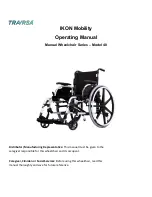
930578 Rev. B
I X . S e t - U p , A d j u s t m e n t & U s e
27
NOTES
1. Work Surface For Set-Up:
Use a flat surface, such as a table, to assemble, adjust and check your chair.
This makes the steps easier and helps ensure a correct set-up.
2. Fasteners:
• Many of the screws and bolts on this chair are special high-strength fasteners
and may have special coatings.
• Many nuts are of the Nylock type. They have a plastic insert to help
prevent loosening.
• Only use screws, bolts and nuts provided by Sunrise.
1. Use of improper fasteners may cause the chair to fail.
2. Over- or under-tightened fasteners may fail or cause damage to chair parts.
3. If bolts or screws become loose, tighten them as soon as you can. Loose
bolts or screws can cause damage to other chair parts causing them to fail.
3. Washers & Spacers:
• Note the position of washers and spacers before disassembly.
• To avoid damage to the frame, replace all washers and spacers when you
reassemble parts.
4. Torque Settings:
• A torque setting is the optimal tightening for a particular fastener. Use a torque
wrench that measures inch-pounds to secure screws, nuts and bolts on this chair.
NOTE
– Unless otherwise noted, use a torque setting of 120 inch-pounds for all fasteners.
TOOLS YOU WILL NEED
1. Basic Tool Kit:
To set-up, adjust and maintain your chair you will need the following tools:
• 7/16" box and open-end wrench
• 1/2" box and open-end wrench
• 3/4" box and open-end wrench
• 5/32" Allen wrench
• 3/16" Allen wrench
• Phillips screwdriver #2
• Custom axle wrench (or a 1/2" open-end wrench)
You can obtain a multi-purpose tool kit from Sunrise, or buy the tools you need from a
hardware store.
2. Torque Wrench:
If you plan to adjust and maintain this chair yourself, Quickie recommends that
you use a torque wrench.
NOTE–
The wrench must measure inch-pounds. You can buy a torque wrench and prop-
er sockets from a hardware store.
V I I I . T i p s F o r A t t e n d a n t s
930578 Rev. B
26
1. Persons who help a rider do one of the following tasks should review and
heed the warnings “Notice to Attendants” and all warnings in this Manual
for that task.
2. The “Tips” that follow are suggestions only. Be aware that you will need to
learn safe methods best suited to the rider and to your abilities. Consult
your health care professional for instructions.
A. TO CLIMB A CURB OR SINGLE STEP
The following is one way to safely help a rider climb a curb or single step going
forward
:
1. Stay behind the chair.
2. Face the curb and tilt the chair up on the rear wheels so that the front casters
clear the curb or step.
3. Move forward, placing the front casters on the upper level as soon as you are
sure they are past the edge.
4. Continue forward until the rear wheels contact the face of the curb or step.
Lift and roll the rear wheels to the upper level.
B. TO DESCEND A CURB OR SINGLE STEP
The following is one way to safely help a rider descend a curb or single step going
backward
:
1. Stay at the rear of the chair.
2. Several feet before you reach the edge of the curb or step, turn the chair
around and pull it backward.
3. Proceed carefully. Look over your shoulder and carefully step back until you
are off the curb or stair and standing on the lower level.
4. Pull the chair toward you until the rear wheels reach the edge of the curb or
step. Then allow the rear wheels to slowly roll down onto the lower level.
5. When the rear wheels are safely on the lower level, tilt the chair back to its
balance point. This will lift the front casters off the curb or step.
6. Keep the chair in balance and take small steps backward. Be sure to look
where you are going. Turn the chair around and gently lower front casters
to the ground.












































